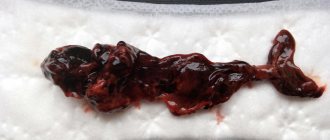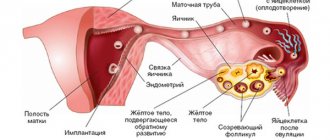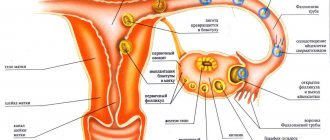If you're trying to get pregnant, the time between ovulation and when you can use a home pregnancy test can seem like an eternity. The problem is that two-week waiting period, you're only (potentially) about four weeks pregnant, so the test might not even show an accurate result yet. Many women look for possible implantation symptoms to understand whether conception has occurred. Cramping and pain can be one of the symptoms of embryo implantation, but sometimes it can be a problem.
The very first symptoms of embryo implantation into the uterus
The birth of a new life is a truly incredible process in which many factors are present. The main and very first symptoms of the beginning of embryo implantation into the uterine cavity are important to know and understand what happens at this stage. But first things first.
First, an egg matures in a woman’s body. Afterwards, it begins to move along the fallopian tube towards fertilization and further to the uterus. Sperm must overcome great difficulty and a long distance to fertilize an egg.
In this case, the sperm must be of high quality and viable.
After fertilization, the human embryo is sent to the uterus to attach to its wall (endometrial layer). If the endometrium is good (lush), attachment (implantation) will be successful. Only after a successful confluence of all these circumstances does successful fertilization and conception occur—there is a chance to create life. Afterwards, the first symptoms of pregnancy appear.
Embryo implantation
The first symptoms of pregnancy occur after consolidation and subsequent implantation of the embryo into the wall of the uterus. Doctors advise monitoring your condition and trying to determine the beginning symptoms and signs of embryo implantation. This is a very important stage of pregnancy.
For example, small discharge similar to menstruation may indicate successful implantation. This happens because the embryo is implanted into the uterus.
The embryo itself already has small villi that are needed for attachment. These villi damage the surface of the uterus in the area of implantation.
After attachment, the embryo begins to implant and join the mother's circulatory system. That's why discharge appears.
A very popular question that interests the expectant mother is: “How long will the implantation of the embryo in the uterus last?” This process lasts about 20 weeks. By the end of this stage, the placenta will already be formed, which protects the baby.
In addition to discharge, a woman may feel weak and unwell during implantation. The temperature rises, usually not higher than 38.0. These symptoms are observed both during natural and artificial pregnancy (IVF).
The possibility of termination of pregnancy at this stage and with such symptoms is rare. Therefore, there is no need to worry. The main thing is to believe and everything will work out.
A woman's immune system may regard a fertilized egg as a foreign object. This happens because the egg contains the father's genes. It would be a good idea to read the article on immunological infertility here.
First symptoms of implantation
HCG (human chorionic gonadotropin) gradually increases from the very beginning of pregnancy, the peak concentration in a woman’s body is reached closer to childbirth. This is just one of the signs that implantation has begun. Other signs are less informative, but may also indicate the beginning of embryo implantation into the uterus.
The most common first signs of implantation are:
- Itching in the uterus.
- Strong pulling in the lower abdomen, as before menstruation.
- Weakness and malaise.
- Nausea.
- Sometimes even vomiting.
- Discharge like menstruation.
- Mood swings and irritability.
- Also, an unpleasant metallic taste in the mouth may indicate the onset of implantation.
In addition to these symptoms, which may indirectly indicate the onset of pregnancy. There are also more significant indicators:
- A slight increase in body temperature, but it can also reach 38.0.
- Discharge, as before menstruation (the main thing is that there are no blood clots in it).
- The most important argument for pregnancy is an increase in hCG.
In the picture below you can see what the results of hCG should be during IVF (after embryo transfer), the same indicators are observed during natural pregnancy.
HCG results for IVF and normal pregnancy
There is also late embryo implantation. This embryo implantation is no different from conventional implantation. Often with late implantation there is no discharge or fever. You can read more about this type of implantation here.
There is such a thing as the implantation period. This period passes before the onset of menstruation, at a time when the woman does not yet know that she is pregnant.
When the embryo enters the uterus from the fallopian tube, it does not immediately begin to implant itself into the wall of the uterus. Within two days he gets used to the new conditions and remains in a free state.
These 2 days and subsequent days, during which attachment to the uterus occurs, form the implantation period.
The main symptoms of pregnancy
During embryo attachment, implantation retraction may occur. During this short period, the body temperature drops slightly. After the temperature drops for several days, the temperature rises, up to 38.0. This phenomenon indicates the beginning of implantation. Here is an example of such a drop in temperature.
Implantation drop in body temperature on the graph
Brief summary
From the very beginning of pregnancy, the implantation period, the expectant mother is obliged to monitor her health and psycho-emotional state. Particular attention should be paid to the first 150 days. After this time, the placenta will be fully formed and the baby will be better protected. Implantation lasts until the end of the placenta formation.
Write comments, ask questions and share your experience. How did implantation manifest itself for you? Has your temperature increased? Please rate this article with stars below. You can share the article with your friends on social networks. Thanks for visiting and watching.
Source: https://ekobesplodie.ru/implantatsiya/samye-pervye-simptomy-implantatsii-embriona-v-matku
Signs of a successful process
We will not dwell on this process in detail, we will only briefly go over it to restore the entire logical chain. So, on a certain day of the cycle, the egg begins its journey through the fallopian tubes to the uterus. She will achieve it anyway. Remaining unfertilized, it will be destroyed here, and another menstruation will occur.
In this case, the endometrial layer that lines the uterus is also subject to rejection. But with the beginning of the next cycle, everything will start again. The nutrient layer of the endometrium in the uterus will be restored, a new egg will mature, and under successful circumstances, pregnancy may occur. For this, only one thing is now necessary: the presence of viable sperm that will reach the fallopian tubes and fertilize the egg.
Is there pain during embryo implantation?
Pregnancy is a long-awaited event for any woman. If fertilization occurs artificially, then pregnancy is especially exciting.
Any little thing can confuse and frighten a woman, be it nagging pain during the process of embryo implantation, ordinary nausea, diarrhea or dizziness.
So, does the woman feel the embryo implantation taking place? Which signs correspond to the normal course of pregnancy, and which require urgent attention to your doctor?
When pregnancy occurs
Typically, pregnancy is considered to have occurred at the moment when the embryo attaches to the wall of the uterus; under natural conditions, this occurs 7-10 days after ovulation. After the implantation of the fertilized egg into the uterus, the woman’s level of the hCG hormone increases, which confirms the fact of pregnancy.
During in vitro fertilization, an already fertilized egg is implanted into a woman's uterus. As a rule, 3-5 day old embryos are implanted. The main question is whether the embryos will attach to the endometrium of the uterus or not. With IVF, late implantation of the embryo is quite typical, that is, after 10 days.
This is explained by the fact that the body cannot always quickly and adequately respond to the transfer of a ready-made fertilized egg. He needs time to adapt to new conditions, in particular, to increase progesterone levels. It is this hormone that prevents the rejection of a fertilized egg and the onset of menstruation.
Sometimes a woman who is at risk of miscarriage is given this hormone artificially.
Why does ovum rejection occur?
Sometimes the embryo cannot attach to the uterus, and then the body rejects it and brings it out. If a woman did not plan a pregnancy, then this process is perceived as ordinary menstruation. Here are some reasons for this:
- Deviations and genetic anomalies of embryo development. A kind of natural selection occurs within a woman. The body “rejects” “low-quality” embryos and gets rid of them.
- Endometrial disorders. This may be a lack of nutrients in the endometrium or a lack of thickness of the upper layer.
- The shiny membrane of the fertilized egg is too hard.
The IVF procedure is complex and expensive. However, it is impossible to take into account all the nuances and factors in advance. Therefore, during artificial insemination, to increase the chances of pregnancy, up to 4 embryos are implanted into a woman.
How to promote implantation
For women planning a pregnancy, doctors recommend following certain rules to prevent embryo rejection, especially after artificial insemination. Many people think that it is best to stay in bed during this time. It's a delusion. A static position does not at all contribute to the advancement of the embryo into the uterus and subsequent implantation.
USEFUL INFORMATION: Why the embryo does not attach to the uterus during IVF
Here's what experts advise:
- It is very useful to take short walks;
- breathe fresh air and ventilate the room;
- exclude heavy physical activity;
- control body temperature;
- give up fitness classes;
- positive emotions are welcomed;
- adhere to the regime: eat right, alternate work and rest;
- sexual intercourse should be postponed until the second trimester of pregnancy;
- do not overcool, but also do not overheat;
- wear comfortable, loose clothing;
- follow preventive recommendations to avoid infection with influenza, ARVI, etc.
There is nothing extraordinary in these tips. However, if you take care of yourself during this period, you will certainly increase your chances of a happy pregnancy.
Signs of successful embryo implantation
There is no need to talk about any specific signs or symptoms of successful embryo implantation, since most women have no idea what important processes are occurring in their bodies. In addition, women may mistake these signs for overwork, approaching menstruation, or poor-quality food.
And yet, here are some symptoms of the implantation of the fertilized egg into the uterus, which girls describe, in particular, after the IVF procedure:
- metallic taste in the mouth;
- slight nagging pain in the lower abdomen;
- dizziness, nausea;
- dark red or brown spotting;
- frequent mood swings, increased irritability;
- slight increase in body temperature.
It should be emphasized that all these signs should not be clearly expressed. That is, if you have heavy discharge or severe pain in the lower abdomen, you should immediately consult a doctor. High body temperature is also a reason for urgent hospitalization.
If there is minor pain during implantation, you should take No-shpu and calm down.
If you are planning to get pregnant, but do not feel the above symptoms, do not worry. Embryo implantation can be asymptomatic. Moreover, you should not specifically look for these sensations in yourself.
This tactic may disappoint you - these signs may really only indicate indigestion or fatigue. Especially often, girls sincerely believe that increased basal body temperature after IVF is a 100% sign of pregnancy.
Unfortunately, this is not the case, because the body simply receives crazy hormonal support, which causes such changes.
USEFUL INFORMATION: Does eco procedure cause cancer?
The only really reliable way to determine embryo implantation is to donate blood for hCG. You can use modern home rapid tests, which also monitor the level of hCG and, based on this, show a verdict: are you pregnant or not.
Thus, there are several features of the onset of pregnancy after IVF that differ from pregnancies that occur naturally. These include: implantation of 3-5-day ready-made embryos directly into the uterine cavity, late implantation of embryos.
The further course of pregnancy, after successful implantation, is no different from ordinary pregnancies. Modern medicine is very successful in in vitro fertilization, giving happiness to many childless couples. The most important thing a woman should do now is to take care of herself, not to panic, and to treat all difficulties and difficulties calmly and thoughtfully.
Source: https://EkoVsem.ru/vse-osnovnye-voprosy/strahi-vo-vremja-eko/boli-pri-implantacii-embriona.html
Time for embryo attachment
For pregnancy to occur, the fertilized egg must develop into a zygote and implant in the uterus. After this, it can be considered an embryo. In order for an embryo to take root in the uterus, its walls must be ready to receive it.
According to doctors, conception can be early or late. With early implantation, which occurs no later than seven days after ovulation, the female body is not yet prepared to receive the embryo; the endometrium does not have the required thickness. But such cases happen infrequently. Late attachment usually occurs on the tenth day after fertilization. This period is considered the most favorable when carrying out the IVF procedure.
In a natural pregnancy, the implantation of the fertilized egg takes at least 48 hours, and they are decisive.
If, at this time, the woman’s body perceives the embryo as a foreign body, the embryo may not attach to the uterus, rejection will occur and menstruation will occur. A woman is considered pregnant after the implantation and consolidation of the fertilized egg in the uterus. This takes from one to three days.
In the protocol, the future embryo develops outside the female body, it is implanted when it is already mature, and it is able to take root faster than in a natural pregnancy. This is the difference between IVF and natural conception. Embryos aged 3–5 days have the highest survival rate.
Implantation pain - how it manifests itself and how to make sure it’s them
If you're trying to get pregnant, the time between ovulation and when you can use a home pregnancy test can seem like an eternity.
The problem is that two-week waiting period, you're only (potentially) about four weeks pregnant, so the test might not even show an accurate result yet. Many women look for possible implantation symptoms to understand whether conception has occurred.
Cramping and pain can be one of the symptoms of embryo implantation, but sometimes it can be a problem.
When does implantation occur?
Not all women experience pain and cramping, but those who do will notice it when the embryo implants in their womb. Cramping will occur at the same time as implantation, between 6 and 12 days after ovulation. At this stage, your fetus is attached to the uterine cavity.
Some people say that implantation pain is a natural way of hinting to the expectant mother that conception has occurred. This method was used long before scientific pregnancy tests. Because of this, they (pains) can be a cause for anticipation, happiness or nervousness.
How does it feel?
You may feel a slight stabbing or nagging pain that appears in the lower abdomen about a week before the start of menstruation.
Cramps are due to the fact that part of the uterine lining “melts” at the implantation site, which allows the fertilized egg to better attach to its wall.
For some women they sometimes last for several days, while for others they go away very quickly.
How to relieve pain from cramps
Remember that they will not last long, since the embryo implantation process takes no more than 1-3 days. You should not take painkillers in this case. Instead, it is better to lie down and elevate your legs to let the pain go away. You should also drink plenty of fluids and rest. Meditation or yoga may also help in some cases.
If you experience severe cramping during pregnancy, it lasts more than a few days, or occurs after you have received a positive result on a home pregnancy test, you should see your doctor.
Most of the time the pain will be minor due to natural processes such as uterine growth or gas, but there are other possible serious causes including urinary tract infections, preeclampsia, placental abruption, premature labor and miscarriage.
Experiences of other women
Taken from a foreign forum:
“I'm trying to get pregnant for the first time, so I have no experience with this. The nurse told me that some of my symptoms may indicate implantation, but I'm not sure. I'm currently 2 days late, so when I started having some mild cramping in my lower abdomen a few days ago, I thought it was due to my period.
But then they never came, and I had two more cases of acute pain in the same place. They lasted only a few seconds, but today there is a constant (mildly painful) pressure in the lower middle of my abdomen. I took a pregnancy test the next day and visited the doctor a few days later. It turned out that I was pregnant."
Other symptoms of implantation
An additional symptom of embryo implantation is spotting or bleeding, and this occurs in approximately 30% of cases. This occurs when an egg penetrates the wall of the uterus, the color of the discharge is usually light brown, red or pink in very small quantities.
In most cases, discharge appears 6-12 days after ovulation and fertilization. This is approximately one to two days after the blastocyst (embryo stage) enters the uterus.
You should not confuse implantation bleeding with menstruation, as it will occur earlier and be more scanty.
Additional symptoms of early pregnancy may include fatigue, breast changes, frequent urination, nausea and mood swings. You may also experience a drop in temperature 7-10 days after ovulation. However, keep in mind that most of these signs appear later, after six to eight weeks of pregnancy.
When can pregnancy be confirmed?
Even if you experience bleeding during implantation, you cannot be sure that pregnancy has occurred. The exact time you should take a pregnancy test depends greatly on the type of pregnancy test. They all work by measuring the amount of hCG (human chorionic gonadotropin), but home tests detect it in the urine, while a lab test detects it in the blood.
Pregnancy test
It is recommended that you do this test at home a week after your missed period.
You will note that tests can vary greatly in sensitivity, ranging from 10 mIU/mL to 40 mIU/mL. If it is less significant, you can use it earlier, and the most sensitive ones can show results four days before the start of their period.
If you test too early, your urine may not have a high enough concentration of hCG, giving you a false negative result and leading to stress. Other reasons why the result may be negative are if you are not pregnant or simply ovulated later than you thought.
In fact, 10% of women may have extremely low hCG levels when their periods are missed. In this case, if it still does not start after three days, repeat the test, as this will give more time for the hormone levels to rise.
Blood analysis
Your doctor may order you to have a blood test for hCG. It is more sensitive and can detect the hormone 6-8 days after ovulation. Despite this, most doctors do not suggest taking it until late unless you need it for medical reasons.
Early pregnancy symptoms such as implantation cramps, coupled with a test or blood test, will definitely show whether you are pregnant or not.
Loading…
Source: https://budumama.club/simptomy-beremennosti/implantacionnye-boli
Attachment of the embryo
The beginning of the natural implantation period is considered to be the time when an embryo with at least 16 cells enters the wall of the uterus and the egg enters the mucous membrane.
The attachment of the fertilized egg in the protocol differs from natural conception in that it is more quickly implanted.
How the embryo attaches to the uterus during IVF:
- in the first two days, a zygote is formed from the oocyte, from which an embryo has four cells by the end of the second day;
- on the third day there are already eight cells, the embryo is ready for transfer, but the likelihood of pregnancy due to its immaturity is low, and further cultivation occurs to the blastocyst stage, which occurs on the fifth day. This period is considered the best for transfer;
- after replantation, within 48 - 72 hours, under favorable conditions, the fertilized egg attaches to the walls and begins to grow, as in a natural pregnancy. But, in order for this to happen, the embryo itself must have the ability to further develop.
It is possible to enter the uterus at the age of 2-4 days, but this is impractical, and the chances of a successful pregnancy are low. After implantation, you need to wait at least two weeks to confirm a positive result.
The fertilized egg is attached in different places. If the embryo is attached high in the uterus, it means that it has implanted close to its bottom, which is the most favorable for its further development. If the embryo does not attach, another menstruation occurs, and the fertilized egg is released along with the discharge.
Does your stomach hurt during embryo implantation - Doctor's advice
Pregnancy is a long-awaited event for any woman. If fertilization occurs artificially, then pregnancy is especially exciting.
Any little thing can confuse and frighten a woman, be it nagging pain during the process of embryo implantation, ordinary nausea, diarrhea or dizziness.
So, does the woman feel the embryo implantation taking place? Which signs correspond to the normal course of pregnancy, and which require urgent attention to your doctor?
Implantation pain - how it manifests itself and how to make sure it’s them
If you're trying to get pregnant, the time between ovulation and when you can use a home pregnancy test can seem like an eternity.
The problem is that two-week waiting period, you're only (potentially) about four weeks pregnant, so the test might not even show an accurate result yet. Many women look for possible implantation symptoms to understand whether conception has occurred.
Cramping and pain can be one of the symptoms of embryo implantation, but sometimes it can be a problem.
Useful tips for expectant mothers
From the first days of conception, a woman must radically change her lifestyle and treat herself with care. Now you are responsible not only for yourself, but also for the little baby in your tummy. Start with the simplest:
- Categorically give up bad habits. If no one can stop you from slowly poisoning your body, then now you should know that alcohol and smoking negatively affect the development of the fetus.
- If there is a need to take medications, then from the moment of conception all of them must be approved by a doctor.
- Try to maintain your immunity at the proper level as much as possible, because now symptoms such as fever and cough are absolutely unnecessary. Drink more fresh vegetable and fruit juices, enrich your diet with folic acid and other microelements beneficial for the baby's development.
- Avoid unnecessary moral stress and shock in every possible way. Remember that your good emotions, just like bad ones, are always felt by the child.
Can the stomach hurt during embryo implantation - Secrets of doctors
If you're trying to get pregnant, the time between ovulation and when you can use a home pregnancy test can seem like an eternity.
The problem is that two-week waiting period, you're only (potentially) about four weeks pregnant, so the test might not even show an accurate result yet. Many women look for possible implantation symptoms to understand whether conception has occurred.
Cramping and pain can be one of the symptoms of embryo implantation, but sometimes it can be a problem.










